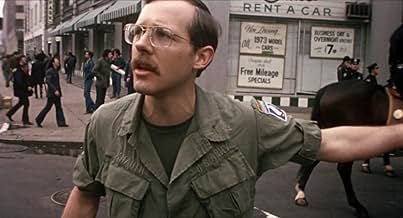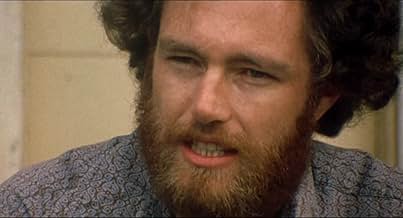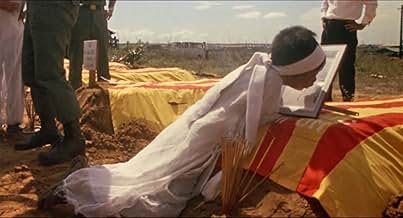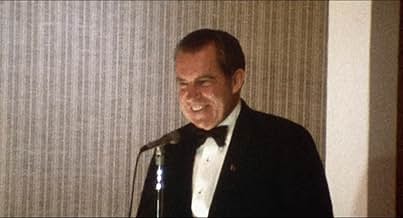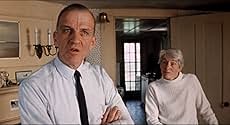AVALIAÇÃO DA IMDb
8,2/10
6,4 mil
SUA AVALIAÇÃO
Um exame das atitudes conflitantes dos oponentes da Guerra do Vietnã.Um exame das atitudes conflitantes dos oponentes da Guerra do Vietnã.Um exame das atitudes conflitantes dos oponentes da Guerra do Vietnã.
- Ganhou 1 Oscar
- 5 vitórias e 1 indicação no total
Ngo Dinh Diem
- Self - President of South Vietnam
- (cenas de arquivo)
John Foster Dulles
- Self - Secretary of State, 1953-1959
- (cenas de arquivo)
Kay Dvorshock
- Self
- (cenas de arquivo)
Dwight D. Eisenhower
- Self - President of the United States
- (cenas de arquivo)
Lyndon B. Johnson
- Self
- (cenas de arquivo)
- (as Lyndon Johnson)
John F. Kennedy
- Self - President of the United States
- (cenas de arquivo)
Robert F. Kennedy
- Self - U.S. Senator
- (cenas de arquivo)
William Marshall
- Self
- (as Sgt. WIlliam Marshall - Detroit)
Eugene McCarthy
- Self - U.S. Senator
- (cenas de arquivo)
Ho Chí Minh
- Self
- (cenas de arquivo)
Avaliações em destaque
I'll admit up front that Peter Davis' documentary makes no effort to show the carnage and torture sponsored and perpetuated by the Viet Cong -- and the one substantial time it explores the way South Vietnamese civilians were imprisoned and tortured by their own government (in huge numbers, by the way), the film isn't very clear about who made these arrests. It concentrates almost solely on the inhumanity and pointlessness of our presence there in a pointless war which even our leaders were unprepared to comprehend.
It's not "balanced" within itself, but given the day-to-day barrage of standard media coverage of the Vietnam war during the time the documentary was made, I believe the making of this film represented an attempt to "balance" the average American's knowledge of what was really going on and how misrepresented the war was by our government and even by the major media most of the time.
All that being said, it's a vivid, important part of the mosaic of American war records. The images are enormously powerful, and where occasionally Mr. Davis' juxtapositions seem overtly manipulative, he still is to be praised emphatically for collecting and assembling this material in such a courageous and uncompromising way. It is essential viewing because of the power of its collected imagery and the lessons about America that we still need to learn. 30 years after the Vietnam war ended, there are still too many essential ways in which that conflict is not understood....and the degree to which we cannot seem, as a nation, to learn from the lessons of Vietnam is only too evident in the manner and attitude with which our leaders have handled and carried on the American military action in Iraq.
Having read a lot of the writings of Vietnam vets over the years about this war, I'm tempted to say that this documentary doesn't go far enough to show the core of absurdity and tragedy at the heart of this war and the way it put young Americans into a hellish situation for no reason and then left them there to be a part of a morally ambivalent, politically and humanly misguided situation, forever disillusioning and haunting an entire generation. But if this film can help younger people to understand just the tip of the iceberg of the enormous tragedy of America's involvement in a pointless 10-year war, then it continues to be worthwhile.
The film itself does not provide nearly enough "backstory" for a student or younger person who did not live through the era. Peter Davis presupposes that the viewing audience knows a lot of things which we knew at the time but which is no longer general knowledge for many viewers. But as a part of an overall attempt (using various sources) to understand that war and its colossal ramifications to our country's self-image, and as a reminder of how easy it is to slip into a tragic imperialism masquerading as some other kind of naive political idealism, it's an essential and vividly effective document of the times for which we owe Mr. Davis a huge debt of gratitude. There is much to be learned from films like this -- including things which our leaders today don't seem to have learned themselves, despite having lived through the Vietnam era.
It's also important to remember that until the Vietnam war, and later Watergate (reminders of which resonate in the presence in this film of "Pentagon Paper"- leaker Daniel Ellsberg), Americans generally believed what their government told them, and didn't think Presidents lied. It may be difficult now to remember there ever was a time when we trusted our government not to be intentionally misleading us, and if Mr. Davis makes a conspicuous effort to emphasize the duplicity of Johnson and Nixon in this documentary, it's probably because it was such a new and unbelievable concept to the overwhelming percentages of Americans before the Vietnam era took place.
It's not "balanced" within itself, but given the day-to-day barrage of standard media coverage of the Vietnam war during the time the documentary was made, I believe the making of this film represented an attempt to "balance" the average American's knowledge of what was really going on and how misrepresented the war was by our government and even by the major media most of the time.
All that being said, it's a vivid, important part of the mosaic of American war records. The images are enormously powerful, and where occasionally Mr. Davis' juxtapositions seem overtly manipulative, he still is to be praised emphatically for collecting and assembling this material in such a courageous and uncompromising way. It is essential viewing because of the power of its collected imagery and the lessons about America that we still need to learn. 30 years after the Vietnam war ended, there are still too many essential ways in which that conflict is not understood....and the degree to which we cannot seem, as a nation, to learn from the lessons of Vietnam is only too evident in the manner and attitude with which our leaders have handled and carried on the American military action in Iraq.
Having read a lot of the writings of Vietnam vets over the years about this war, I'm tempted to say that this documentary doesn't go far enough to show the core of absurdity and tragedy at the heart of this war and the way it put young Americans into a hellish situation for no reason and then left them there to be a part of a morally ambivalent, politically and humanly misguided situation, forever disillusioning and haunting an entire generation. But if this film can help younger people to understand just the tip of the iceberg of the enormous tragedy of America's involvement in a pointless 10-year war, then it continues to be worthwhile.
The film itself does not provide nearly enough "backstory" for a student or younger person who did not live through the era. Peter Davis presupposes that the viewing audience knows a lot of things which we knew at the time but which is no longer general knowledge for many viewers. But as a part of an overall attempt (using various sources) to understand that war and its colossal ramifications to our country's self-image, and as a reminder of how easy it is to slip into a tragic imperialism masquerading as some other kind of naive political idealism, it's an essential and vividly effective document of the times for which we owe Mr. Davis a huge debt of gratitude. There is much to be learned from films like this -- including things which our leaders today don't seem to have learned themselves, despite having lived through the Vietnam era.
It's also important to remember that until the Vietnam war, and later Watergate (reminders of which resonate in the presence in this film of "Pentagon Paper"- leaker Daniel Ellsberg), Americans generally believed what their government told them, and didn't think Presidents lied. It may be difficult now to remember there ever was a time when we trusted our government not to be intentionally misleading us, and if Mr. Davis makes a conspicuous effort to emphasize the duplicity of Johnson and Nixon in this documentary, it's probably because it was such a new and unbelievable concept to the overwhelming percentages of Americans before the Vietnam era took place.
10greg-253
Peter Davis created one of the most moving accounts of the Vietnam War and the attitudes at home when he produced "Hearts and Minds".
The film looks unflinchingly at the nature of power and horrible consequences of war. It is very much a pro-peace film, but uses the people who were there to speak for themselves. It also seeks to probe deeper underneath the American psyche of the times and evolves into a historical document about the violent social rupture that happened between the fifties and the sixties.
In many ways, it feels like a punch in the gut to watch the film. So many ideologies are laid bear....so many were false or misleading.
In the end, the film leaves you thinking about the price of war - and who is given the task to bear that price.
Truly deserving of the Oscar it received - and worthy of repeated viewing.
The film looks unflinchingly at the nature of power and horrible consequences of war. It is very much a pro-peace film, but uses the people who were there to speak for themselves. It also seeks to probe deeper underneath the American psyche of the times and evolves into a historical document about the violent social rupture that happened between the fifties and the sixties.
In many ways, it feels like a punch in the gut to watch the film. So many ideologies are laid bear....so many were false or misleading.
In the end, the film leaves you thinking about the price of war - and who is given the task to bear that price.
Truly deserving of the Oscar it received - and worthy of repeated viewing.
Very good piece on the horrors of war and the stupidity which causes them. Lots of good interviews with former gung-ho jarheads who are now armless, without legs, or sitting forever in wheelchairs. Several clips from interviews with politicos of the era in which one man even went so far as to admit the entire war was a gargantuan error: "I couldn't have been more wrong in my assessment of the situation" was his comment. We really are led by fools. Other footage showed the ravages of the Viet people themselves - not just a bunch of dinks - who lost homes, families, and entire villages. The most telling scene for me was of the 2 parents mouthing their patriotic "he died fighting for freedom" gibberish in defense of a useless war which took their son away forever. Maybe this was merely their own defensive mechanisms at work but it made them appear so painfully ignorant of what was going on around them. This should be viewed by all, especially those who were around at the time and remember all the conflicting emotions.
Davis does a neat job of laying out the absurdity in the US's involvement in Vietnam. He does it mainly through the use of two techniques.
(1) Successive contrast, as it's called in the psychology of perception. If you stare at a black square for a while, then switch your gaze to a gray square, it looks white, not gray. In this movie Davis juxtaposes moments from interviews and newsreel footage to demonstrate how far removed high-level speeches can be from events as they take place on the ground. General Westmoreland, who, like General Douglas MacArthur, was another one of those giants in the field of Oriental psychology, explains to us that Asians don't place the same kind of value on human life as Westerners do. (He might have been thinking of kamikaze attacks from WWII.) Cut to a Vietnamese funeral full of wailing mourners. A coach gives a pep talk, screaming and weeping, to a high school football team in Niles, Ohio. "Don't let them BEAT US!" he cries. Cut to a scene of combat.
(2) Selective interviewing and editing. The Vietnamese seem to speak nothing but common sense and they are seen doing nothing but defending themselves -- and very little of that. The Americans that we see and hear are mostly divided into two types: phony idiots and wised-up ex-patriot veterans. Fred Coker is an exception. He's a naval aviator who was evidently a POW. He's clean-cut, intelligent, and articulate, and he's given a lot of screen time. This is all for the good because he's about the only pro-war character we see. He's been there and he still believes. He serves as a useful bridge between the pro-war idiots and the embittered anti-war Americans.
And of course the statements we hear on screen are selected for their dramatic value. One former pilot describes how he and his comrades approached their bombing missions -- for some of them it was just a job, part of the daily grind, but for some others it got to be kind of fun. And for him? "I enjoyed it." The amazing thing in propagandistic documentaries like this is not that the sound bites were selected. Of course they were, otherwise you'd have a dull movie of a thousand people from the middle of the road. "Dog bites man" is not news. "Man bites dog" IS news! No, the truly astonishing thing is that some of the interviewees actually SAID these things in the first place. Selective or not, here is the evidence on film. And how is it possible to "take out of context" General Westmoreland's disquisition on the Oriental attitude towards life? Or a vet smirking and saying he enjoyed killing Gooks?
I'm reminded of a scene in Michael Moore's first documentary, "Roger and Me." Moore is talking to a handful of rich wives who are on some Flint, Michigan, golf course, chipping balls. His camera rolls on and on while the ladies chat about the closing of the plants and the movement of jobs to cheaper labor markets. They love the area around Flint -- great golf courses, good riding country. And the newly unemployed? Well, says one of the wives, before a swing, now they'll have to get up and find a job. Poor people are always lazy anyway.
It's a shocking statement, and we hear similarly shocking statements throughout this movie. It all leaves a viewer with a sense of awe that anyone could be so unashamedly deluded.
I don't see any reason to point out the similarities between what happened in Viet Nam and what's going on as I write this. I wish our current leaders, practically none of whom served in the military let alone Viet Nam, could have seen this because it might have served as a useful reminder that war isn't REALLY very much like a high school football game.
G. K. Chesterton once wrote, "My country, right or wrong, is a thing no true patriot would think of saying. It is like saying, 'My mother, drunk or sober'".
(1) Successive contrast, as it's called in the psychology of perception. If you stare at a black square for a while, then switch your gaze to a gray square, it looks white, not gray. In this movie Davis juxtaposes moments from interviews and newsreel footage to demonstrate how far removed high-level speeches can be from events as they take place on the ground. General Westmoreland, who, like General Douglas MacArthur, was another one of those giants in the field of Oriental psychology, explains to us that Asians don't place the same kind of value on human life as Westerners do. (He might have been thinking of kamikaze attacks from WWII.) Cut to a Vietnamese funeral full of wailing mourners. A coach gives a pep talk, screaming and weeping, to a high school football team in Niles, Ohio. "Don't let them BEAT US!" he cries. Cut to a scene of combat.
(2) Selective interviewing and editing. The Vietnamese seem to speak nothing but common sense and they are seen doing nothing but defending themselves -- and very little of that. The Americans that we see and hear are mostly divided into two types: phony idiots and wised-up ex-patriot veterans. Fred Coker is an exception. He's a naval aviator who was evidently a POW. He's clean-cut, intelligent, and articulate, and he's given a lot of screen time. This is all for the good because he's about the only pro-war character we see. He's been there and he still believes. He serves as a useful bridge between the pro-war idiots and the embittered anti-war Americans.
And of course the statements we hear on screen are selected for their dramatic value. One former pilot describes how he and his comrades approached their bombing missions -- for some of them it was just a job, part of the daily grind, but for some others it got to be kind of fun. And for him? "I enjoyed it." The amazing thing in propagandistic documentaries like this is not that the sound bites were selected. Of course they were, otherwise you'd have a dull movie of a thousand people from the middle of the road. "Dog bites man" is not news. "Man bites dog" IS news! No, the truly astonishing thing is that some of the interviewees actually SAID these things in the first place. Selective or not, here is the evidence on film. And how is it possible to "take out of context" General Westmoreland's disquisition on the Oriental attitude towards life? Or a vet smirking and saying he enjoyed killing Gooks?
I'm reminded of a scene in Michael Moore's first documentary, "Roger and Me." Moore is talking to a handful of rich wives who are on some Flint, Michigan, golf course, chipping balls. His camera rolls on and on while the ladies chat about the closing of the plants and the movement of jobs to cheaper labor markets. They love the area around Flint -- great golf courses, good riding country. And the newly unemployed? Well, says one of the wives, before a swing, now they'll have to get up and find a job. Poor people are always lazy anyway.
It's a shocking statement, and we hear similarly shocking statements throughout this movie. It all leaves a viewer with a sense of awe that anyone could be so unashamedly deluded.
I don't see any reason to point out the similarities between what happened in Viet Nam and what's going on as I write this. I wish our current leaders, practically none of whom served in the military let alone Viet Nam, could have seen this because it might have served as a useful reminder that war isn't REALLY very much like a high school football game.
G. K. Chesterton once wrote, "My country, right or wrong, is a thing no true patriot would think of saying. It is like saying, 'My mother, drunk or sober'".
A documentary of the conflicting attitudes of the opponents of the Vietnam war.
Roger Ebert wrote, "Here is a documentary about Vietnam that doesn't really level with us... If we know something about how footage is obtained and how editing can make points, it sometimes looks like propaganda... And yet, in scene after scene, the raw material itself is so devastating that it brushes the tricks aside." Exactly right. The folks who made this are clearly anti-war, but some of the footage they get is unforgettable.
Most notably is the interview with General William Westmoreland where he says, "The Oriental doesn't put the same high price on life as does a Westerner. Life is plentiful. Life is cheap in the Orient." How can that be interpreted any other way?
The movie was chosen as Academy Award for Best Documentary Feature at the 47th Academy Awards presented in 1975. This win was not only well-deserved, but opened the door for possibly an even better Vietnam documentary: Errol Morris' "The Fog of War: Eleven Lessons from the Life of Robert S. McNamara" (2003), which also won the Oscar.
Roger Ebert wrote, "Here is a documentary about Vietnam that doesn't really level with us... If we know something about how footage is obtained and how editing can make points, it sometimes looks like propaganda... And yet, in scene after scene, the raw material itself is so devastating that it brushes the tricks aside." Exactly right. The folks who made this are clearly anti-war, but some of the footage they get is unforgettable.
Most notably is the interview with General William Westmoreland where he says, "The Oriental doesn't put the same high price on life as does a Westerner. Life is plentiful. Life is cheap in the Orient." How can that be interpreted any other way?
The movie was chosen as Academy Award for Best Documentary Feature at the 47th Academy Awards presented in 1975. This win was not only well-deserved, but opened the door for possibly an even better Vietnam documentary: Errol Morris' "The Fog of War: Eleven Lessons from the Life of Robert S. McNamara" (2003), which also won the Oscar.
Você sabia?
- CuriosidadesDuring his Oscar acceptance speech, producer Bert Schneider read a letter from the head of the Viet Cong lauding his film. Bob Hope prompted Oscar host Frank Sinatra to disclaim any political statements that had been made during the show.
- Citações
Daniel Ellsberg: The question used to be: might it be possible that we were on the wrong side in the Vietnamese War? But, we weren't on the wrong side. We are the wrong side.
- Cenas durante ou pós-créditosThe listed translators credited in the movie (Le Thai To, Trung Trac, Le Thanh Tong and Trung Hung Dao) were all Vietnamese generals who had defeated the Chinese in various times from the first century C.E., to the fifteenth century C.E. The translator listed as Nguyen Ai Quoc was an early alias of Ho Chi Minh, founder of the Vietnamese Communist Party. I have no knowledge of the last listed translator, Barbara Gore. Apparently, someone played a good joke on the producers of this film, if it wasn't the translators themselves.
- ConexõesFeatured in Sneak Previews: Take 2: Vietnam Movies (1980)
Principais escolhas
Faça login para avaliar e ver a lista de recomendações personalizadas
- How long is Hearts and Minds?Fornecido pela Alexa
Detalhes
- Data de lançamento
- País de origem
- Centrais de atendimento oficiais
- Idiomas
- Também conhecido como
- Hearts and Minds
- Locações de filme
- Empresas de produção
- Consulte mais créditos da empresa na IMDbPro
Bilheteria
- Faturamento bruto nos EUA e Canadá
- US$ 28.754
- Fim de semana de estreia nos EUA e Canadá
- US$ 8.556
- 24 de out. de 2004
- Faturamento bruto mundial
- US$ 28.754
Contribua para esta página
Sugerir uma alteração ou adicionar conteúdo ausente

Principal brecha
By what name was Corações e Mentes (1974) officially released in India in English?
Responda

